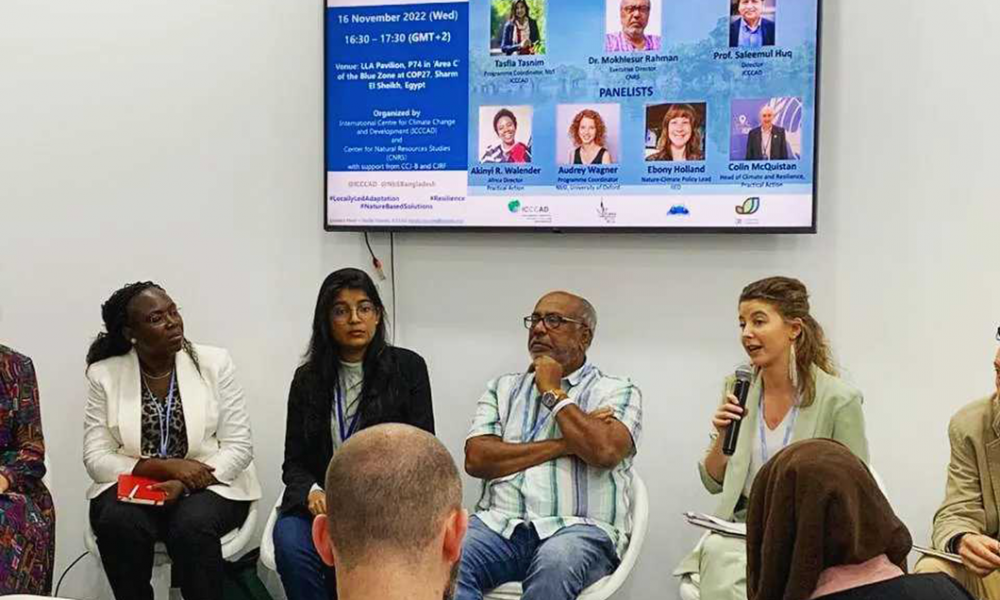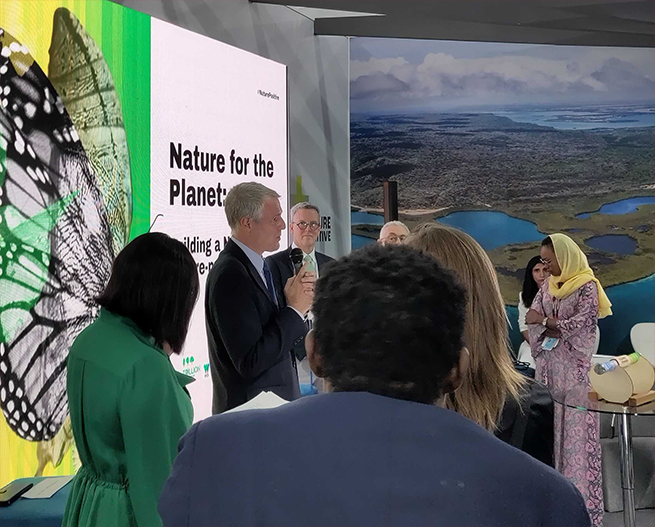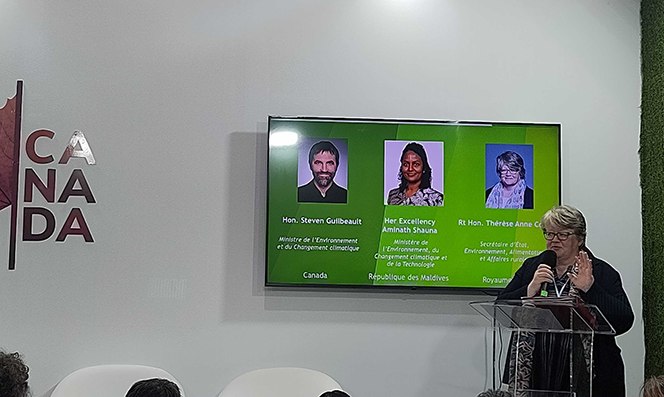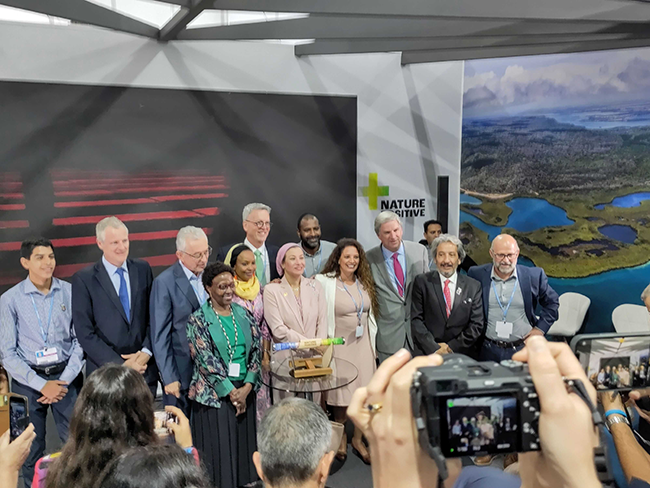From global to local: lessons on scaling up Nature-based Solutions from COP27
Associated sprints
recent news
- Growing Positive Change
- The Agile Initiative Enabling Fund
- Pre-announcement: Next Sprint Funding Call to Open in September 2024

As we enter our fourth month of work on our Agile sprint on Scaling Up Nature-based Solutions in the UK, team member Audrey Wagner reflects on her time at COP27 and considers what we can learn from the recent events at COP27.
Global advances on NbS at COP27
At COP27 in Sharm el-Sheikh, Egypt, nature-based solutions (NbS) and nature more broadly played a prominent role. Dozens of side events about nature-based solutions took place, ranging from focusing on NbS for mitigation or adaptation to how to finance NbS and how to prevent NbS from being used for greenwashing. The Nature Zone pavilion, entirely dedicated to side events about nature, had a packed schedule over the two weeks of COP27.
Most notably, the Egyptian COP27 Presidency, along with the German government and supported by the IUCN, launched the ENACT (Enhancing Nature-based Solutions for an Accelerated Climate Transformation) partnership to foster global collaboration on NbS: Read more about the launch of ENACT here.
Several other important NbS-related announcements and events took place over the course of the two weeks, including the launch of the Forest and Climate Leaders’ Partnership (FCLP), a report by the World Business Council for Sustainable Development (WBCSD) on The role of Nature-based Solutions in strategies for Net Zero, Nature Positive and addressing Inequality, the launch of the Mangrove Breakthrough, and an event organized by the IUCN on Catalyzing NbS for Climate and Biodiversity Action.
The UK, along with 16 other countries including the Maldives, Ecuador, and Gabon also held several meetings and events at COP27 to discuss their collaboration on a 10 Point Plan for Financing Biodiversity in order to scale up finance for NbS, first announced in September 2022. Read about the 10 Point Plan here.
During COP27, Oxford’s Nature-based Solutions Initiative (NbSI) launched a new version of its Global Map of NbS Best-Practice Case Studies, which now contains information on the governance, financing, tradeoffs and monitoring for each case study. As our Agile project on NbS progresses, we will partner with NbSI to add more cases on NbS in the UK to this map. Sprint team members also took part in a panel event on Blending People’s Participation & Nature-based Approaches for Enhancing Community Resilience, where Audrey Wagner outlined that participatory NbS can strengthen the social fabric of a community and increase its adaptive capacity, contributing to enhancing resilience.
NbS was not solely confined to the side-events. For the first time ever, the term NbS was included in a UNFCCC COP cover text. Having a multilaterally agreed definition of NbS approved by the United Nations Environment Assembly at UNEA-5 greatly facilitated this feat. This builds on the inclusion of NbS in other UN convention texts, such as the UN Convention on Combating Desertification (UNCCD) and the Ramsar Convention on Wetlands.
The inclusion of the term NbS in the COP27 cover text is important, because it creates a policy lever for Parties to invest in scaling up NbS while also giving Parties oversight to ensure that NbS adhere to the UNEA-5 definition, are not misused for greenwashing, and are implemented with integrity. This means that NbS must support and enhance biodiversity, be people-led and respect human rights, provide positive social outcomes locally, and be implemented in tandem with, not instead of, drastic cuts in greenhouse gas emissions. You can read more about the significance of NbS being in the COP27 cover text here.
NATIONAL COMMITMENTS ON NBS AT COP27

Many countries, including the UK, championed NbS at COP27 and beyond, highlighting the importance of NbS for their own national contexts.
For example, the US came out with an NbS Roadmap, which outlines strategic recommendations for utilising NbS to address climate change, biodiversity loss, and inequity in the United States. This US roadmap can serve as inspiration on how to scale up NbS in a UK context. The US also played a big part in retaining the term NbS in the COP27 cover decision text.
For Brazil, the presence of president-elect Lula at COP27 was transformative, signifying that Brazil is back on the international stage and serious about tackling deforestation and strengthening the rights of indigenous land defenders.
The UK was also very involved in NbS-related initiatives at COP27, with both Thérèse Coffey, Secretary of State for the Department of Environment, Food and Rural Affairs (Defra) and the Rt Hon Lord Zac Goldsmith, Minister of State for Overseas Territories, Commonwealth, Energy, Climate and Environment at the Foreign and Commonwealth Development Office, participating in several events about NbS.
“There is no solution to climate change without nature…. So it’s good that COP27 decisions re-affirm the centrality of nature-based solutions,” tweeted Lord Zac Goldsmith during COP27.
At an event at the Canada Pavilion on Biodiversity Day at COP27, Thérèse Coffey spoke about UK’s involvement in the 10 Point Plan for Financing Nature and about the need for the COP27 cover decision text to signal a call for a successful agreement for nature at COP15. Coffey also outlined five ways the UK is taking action for nature and climate change.
WHAT DOES COP27 MEAN FOR THE AGILE SPRINT ON SCALING UP NBS IN THE UK?

The ground-breaking international recognition of the role of NbS in tackling the climate crisis, coupled with the demonstrable commitment to NbS by key UK government ministers, provides stronger policy leverage for scaling up NbS in the UK. However, it also increases the risk that there could be a rush to deliver poorly designed interventions that fail to maximize the multiple environmental and socio-economic benefits of NbS, potentially even causing a backlash against the concept.
This reinforces the need for the two key purposes of this Agile Sprint: providing tools and guidance to enable practitioners to deliver well-designed and sustainable NbS, and encouraging policymakers to provide a suitable regulatory framework, governance and funding to support delivery of high quality NbS in the right places.
There were also opportunities to learn directly from other nations at COP27 – such as the NbS Roadmap announced by the US government, which could provide inspiration and ideas for scaling up NbS in the UK.
Next steps – looking ahead to CBD COP15
Building on COP27, one of the UK government delegation’s priorities is to get NbS included in the UN Convention on Biological Diversity (CBD) COP15, beginning in a few days on December 7th, 2022 in Montreal, Canada.

Three NbS researchers from Oxford University will be attending, including Audrey Wagner from the Agile Sprint, and will be focusing on the role of NbS in the Post-2020 Global Biodiversity Framework. As NbS rise up the international agenda, it is more important than ever to counter disinformation and continue spreading awareness of the importance of delivering high quality NbS with multiple benefits for nature and people, in line with the IUCN Global NbS Standard.
As COP15 begins, UK civil society, including the RSPB, WWF-UK and the Woodland Trust, has initiated an Urgent Conversation campaign, urging the UK government to deliver a strong outcome at COP15 that reverses biodiversity loss by 2030. This adds to calls from many global actors, heard prominently at COP27, emphasizing the importance of achieving a ‘Paris Moment’ (referring to the landmark UNFCCC Paris Agreement agreed in 2021) for biodiversity.
At the end of COP27, a ceremony took place in the Nature Pavilion where the ‘nature positive baton’ was symbolically passed from the UNFCCC to the CBD, on the road from COP27 to the upcoming CBD COP15, representing the important role of nature in bridging the interlinkages and synergies between the climate and biodiversity crises. The stage has been set for high expectations for NbS at COP15, these recent developments are only the start of what is possible.


